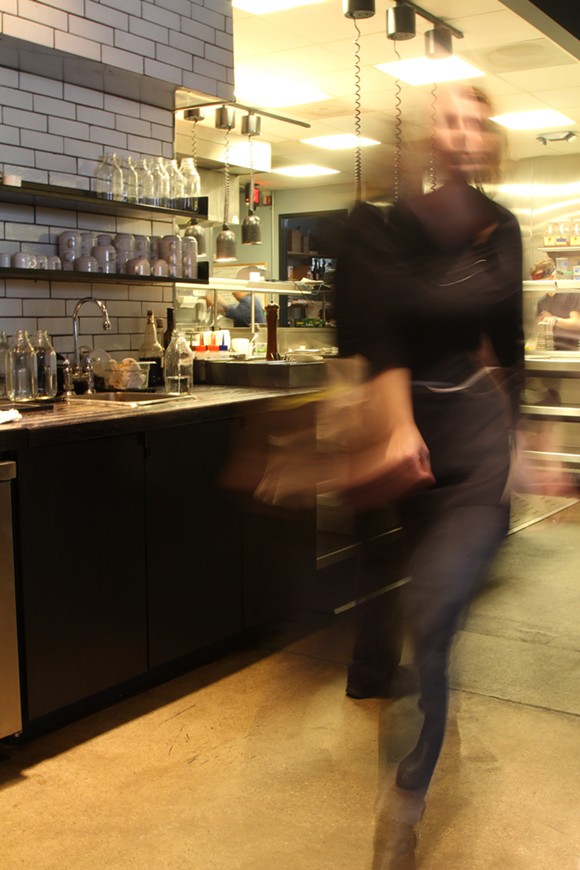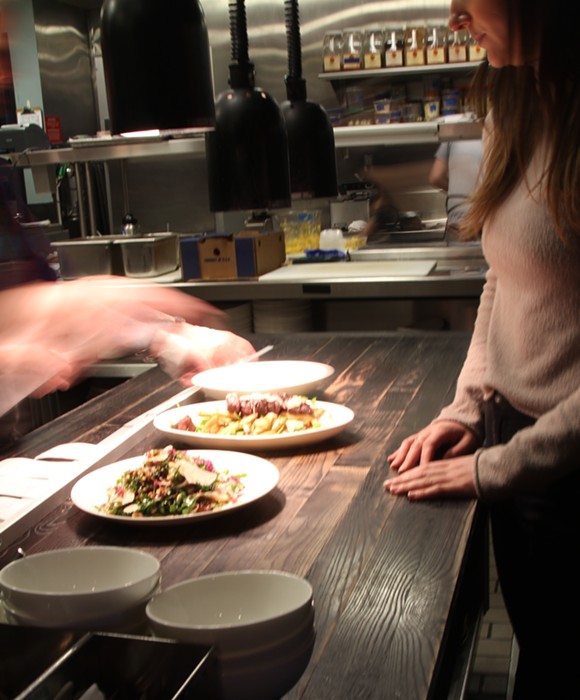I walked into Mudgie's, Corktown's beloved and oft-praised deli, for the first time on Dec. 26. I was meeting a friend and arrived first. I did as a sign politely bade me, and I waited to be seated. I waited. And I waited.
From the dining room, several servers glanced my way. The bartender definitely saw me. Yet no one acknowledged my existence. No one greeted me or even casually shouted "Someone will be right with you," in my general direction. And so I stood, feeling unwanted, out of place, and like maybe I was doing it wrong.
At last, after what seemed like a lifetime but was probably only 10 minutes, an unsmiling server arrived to ask what she could do for me. And my awkward answer was something like, "I'd like to eat."
At that point, an unsmiling hostess emerged from the restroom and, with a grimace that could only mean that my presence was a complete impertinence, led me to a table by the window where I waited for my companion to arrive.
Equipped with some laminated 11-by-17 menus, I began the great task of deciding what to eat and drink at a new-to-me restaurant.
In the end, I would have plenty of time to choose.
My friend arrived about 10 minutes later, but it would be another 15 before our server greeted us. The rest of our visit would follow suit: A mostly absent server would deliver our soup and sandwich combos — but a soup first, and then 20 minutes later, a sandwich. It's not the most terrible thing that's ever happened, but it's annoying. Especially if you are a person, such as myself, who enjoys dipping the sandwich in the soup.
In the end, I tipped my server more than 20 percent. I spent 10 years waiting tables, so unless someone spits directly onto my body and it's unequivocally on purpose, I'll tip generously. Servers only make $3.38 an hour, don't you know.
A service desert
It seems that for all the buzz in recent years about Detroit's dining scene, the city is suffering from a good server drought. Maybe all the people who've committed their life to the hospitality industry have moved on to New York or Chicago. Or maybe I'm not eating at the right places. Or maybe, more horrifyingly, I'm one of those terrible customers who elicits crappy service for any number of reasons, including, but not limited to, having an inappropriate haircut.
A couple days after my visit, I called Greg Mudge, the affable owner of Mudgie's. An idea had been percolating for awhile anyhow, and I wanted to get his perspective, especially after my experience at his restaurant. While Mudge's insight was nothing revolutionary, I can sympathize with his plights. Like most small-business owners, he works with a skeleton crew, and keeping his fast-casual restaurant appropriately staffed is a delicate balancing act. Inevitable staff turnover means someone is constantly shaking the tightrope.
"You're forced to run the restaurant with the perfect amount of people on staff, and if someone leaves, you end up throwing a new employee to the wolves," Mudge says. "It's very rare to have enough time to fully train someone properly."
For the most part, Mudge says he's happy with the team he's assembled. Many of his servers have been with him for years, working full time, treating customers well, and making a decent living.
But sometimes, he says, servers have an off day, and while office workers can hide in their cubicles and weep silently when their family dog dies, servers have to slap on a smile for their customers.
A likely conclusion, then, would be that servers are people too, and that all people make mistakes and have bad days and fail to communicate properly. But if that were the only conclusion, it would mean bad service in Detroit restaurants is an anomaly, not the status quo. While conducting my own unscientific research — simply, going out to eat — I've found the opposite to be true.
Of course, the answers — yes, there are more than one — to this question are as unscientific as the research. There's no data to prove my point, but by and large when I bring up the topic, people tend to agree with me.
With a rush of new restaurant openings in recent years, the industry's already shallow employee pool is being quickly drained. And as it stands, much of Detroit's service industry is made up of transients: People working their way through school, or people who've graduated, but haven't yet found a 9-to-5, or they're in a band and they need a gig between tours. They're here because they've made an immediate choice to address an immediate issue. This isn't an investment in their future. They won't proudly add this experience to their résumé. They don't want to serve tables into perpetuity.
"Most people aren't in the service industry because they want to be servers," Mudge says. "Some people are just in limbo."
Evan Hansen knows this all too well. As the owner of Detroit's Selden Standard, a two-and-a-half-year-old restaurant that has risen to the top of the scene's food chain, Hansen says at first he had a hard time finding experienced servers who matched his vision for the restaurant.
"There were very few people who had worked in fine dining," he says.
‘People don’t contact management anymore. They instantly runto Yelp.’
tweet this
Hansen says he and his team worked hard to cultivate a passionate staff. They sought out people — many of whom were out-of-state transplants — who'd treat their gig as a legitimate career.
"Historically that's not an attitude people in Detroit have," Hansen says.
The service industry is often treated as an illegitimate profession, one that's less respected than, say, a skilled trade and far less than the coveted desk job. Workers often don't receive health insurance or other benefits. Their incomes wax and wane, making it difficult for them to nail down a mortgage or a car note.
Alicia Farris runs the Michigan chapter of the Restaurant Opportunities Center, or ROC, where she advocates for service industry workers to make a living wage while continuing to be tipped for outstanding service.
"We do not say 'no tips.' We believe that people should be tipped if they give exemplary service," Farris says. "We think they should be paid a fair and living wage."
Farris believes a "living wage" for metro Detroiters is as much as $15 per hour, which amounts to a gross annual income of $31,200. Many, including a local chapter of Fight for $15 called Detroit 15, are advocating for that change to happen sooner rather than later.
Current federal legislation requires employers pay a minimum of $9 per hour by 2018, but some municipal governments have gone much further.
A handful of cities across the country have passed legislation to bump the minimum wage up yearly until it hits $15. Los Angeles promises all workers will make at least $15 per hour by 2020. In Seattle, a $15 minimum wage has already been rolled out, but legislation only requires the city's largest companies to abide. They're hoping to apply it to all employers by 2021. Other cities are making changes gradually, upping pay rates for city workers first before rolling out plans to make a $15 minimum wage mandatory.
On Detroit's east side, Rose's Fine Food co-owner Molly Mitchell pays her staff a living wage, and guests can tip on top of that, if they feel so inclined. A note inside their menu reminds customers their prices (which may seem high to some) reflect not only the use of quality ingredients, but the wages paid to their employees.
The quarters are tight inside Rose's, but the service is great. During a recent visit, a comely waitress diligently refilled my coffee before asking, "What can I get you, child?" which I found endearing, but my mother would find patronizing. During another Saturday morning visit the place was packed, leaving little room for patrons to wait for a table, but a colorfully dressed hostess with large ornate earrings floated gracefully among patrons, making everyone feel a little bit special and lightly mothered.
With the help of restaurants like Rose's — plus, fine dining establishments like Chartreuse, Selden Standard, and Mabel Gray — the narrative of Detroit's service industry is changing. Detroit is slowly beginning to amass a rank of hospitality virtuosos.
Lindsay Martinik is among them. She serves tables at Mabel Gray, James Rigato's esteemed Hazel Park fine dining establishment, after cutting her teeth at the now-shuttered Morel's, then Forest Grill, and Cafe Muse.
"I wish people knew they could have a really great career working in the service industry," Martinik says. "But people don't realize they can be fulfilled by this work."
The money is there, but Martinik says she had to stop looking for it before it came to her. She had to forget her wallet and focus on creating a holistic experience for her customers.
"In the beginning, money was my motivator, but then I became really passionate about my work," Martinik says. "Once I stopped worrying about money, it came."
It helps that Martinik works in an establishment that encourages this philosophy along with providing a continuous stream of education. Martinik says management at Mabel Gray creates daily opportunities for servers to learn and grow in their food knowledge.
Those education opportunities cultivate able servers, and not only benefit the server, but also management, customers, and ultimately the establishment itself.
And that, Martinik says, is what Detroit needs.
"We need more passionate people," Martinik says. "More people who live and die by the restaurant industry."
Of course, we need to be good customers too. And, believe it or not, being a good customer means complaining.
"People don't contact management anymore," Martinik says. "They instantly run to Yelp. If you have a problem, tell your server. You should feel comfortable doing that."
‘A lot of people feel obligated to tip 18 to 20 percent because they don’t want to look bad, but who’s getting punished?’
tweet this
Mudge is also familiar with criticism being funneled through the wrong channels.
"I want to do whatever it takes to make my customers happy, but it's hard to get out of the guest that they're having a bad time," Mudge says. "They've become shy."
To some this revelation will seem shocking, but Mudge thinks complaints could revitalize the industry.
"I wish customers would seek a manager," he says. "I would have made it right, and the customer would have left happy. People shouldn't feel bad complaining. If they complained, the industry would change."
Instead, he says, they skip on home and onto the internet where they write about their bad experience on social media.
Mudge also says — and he's right — that I'm part of the problem.
Remember that 20-plus-percent tip I left the absent server at his restaurant? Well, he reasons that my tip was my feedback. I'm saying to the server, "You did great. Everything was fine. Here, take my money."
"A lot of people feel obligated to tip 18 to 20 percent because they don't want to look bad, but who's getting punished?" Mudge says. "Ultimately it gives the server a false sense of what's going on."
If we expect to have great service, we need to give honest, critical feedback. For diners, that feedback is their dollar.
The art of service
Molly Abraham's name is well-known in Detroit. She's been a restaurant critic for decades, writing for The Detroit News and Hour Detroit, among others. She's visible in the community, known for dining out at long-standing Detroit establishments as well as brand-new joints.
Her view of Detroit's service industry is much different than mine. She says she gets great service wherever she goes.
Furthermore, she thinks people these days expect too much of servers.
"The public has gotten fussier about what good service is," Abraham says. "Servers have to do a little more now. They have to be a little more gracious. They have to know about the menu without asking the kitchen."
And that's unequivocally true. As chefs' and diners' tastes have become more sophisticated, nowadays servers are expected to have an elevated knowledge and expertise about the food and drinks they're serving. Gone are the days when one could merely suggest something is "good." Now they're expected to know each menu item intimately, offering tasting notes, comparisons, and drink pairings.
But that's a level of nuance that goes beyond my thesis. I just want someone to smile when they greet me and make sure my water glass isn't empty. Yet, so often even those simple tasks go unfulfilled.
Gone are the days when servers could merely suggest something is ‘good.’ Now they’re expected to know each menu item intimately, offering tasting notes, comparisons, and drink pairings.
tweet this
Brock Massaro works alongside Martinik, serving tables at Mabel Gray. The native Detroiter had been living in New York and working in fine dining restaurants but decided to move home when his wife was pregnant with their first child. He got a gig as a bartender at the then-hot Gold Cash Gold. He's experienced the rush of Detroit's burgeoning restaurant industry firsthand.
"We're such a new industry, especially in Detroit," Massaro says. "I think opening places and making money is at the top of the list for any operator. Service falls at the wayside. A lot of times just getting bodies in there is important."
In contrast to Abraham's experience, Massaro says he's often less than impressed with the service he receives in new Detroit restaurants.
"I don't dine out in Detroit because I've had so many bad experiences," Massaro says.
But, he knows that getting crappy service is part of the territory, considering the scene's immaturity.
"We're in a puberty where everyone is trying to grow, but not knowing how to do that," Massaro says.
Casual fine dining restaurants like Mabel Gray have the opportunity to change that narrative by training and educating staff and turning out a workforce that can go on to work at new establishments as they open. And Massaro is setting a great example for his successors.
"When I'm waiting on tables, I'm the kind of waiter I would want to have," he says. "I'm going to greet you immediately when you sit down, I'm going to make sure your water is full, I'm going to make sure you have fresh silverware between courses. I'm going to process the check quickly."
More than a meal
Devita Davison is outspoken by nature and not short on opinions. As the marketing and communications director at FoodLab Detroit, she advocates for racial and economic justice within Detroit's food industry. But when it comes to Detroit's service industry, she's quick to note that she doesn't want to "paint with a broad stroke" when addressing the issues it faces.
"It's a mixed bag for me," Davison says of her experiences dining in Detroit. "There are certain situations where the service is not up to par, but some restaurants are doing a great job."
But as Detroit experiences an ongoing renaissance, Davison says our overall take on customer service needs to improve, whether in a fine dining restaurant, a deli, or a shop.
"In general I think that customer service in Detroit is something that definitely needs improvement," Davison says. "I'm not just talking about white tablecloth restaurants, but also service at fast casual restaurants, and other industries."
Davison says improving customer service ultimately means investing in training employees — a model that restaurants like Mabel Gray and Selden Standard are proving works — an investment that will benefit the industry overall.
"How are we training our staff and how are we creating a culture in these restaurants where people will want to work?" Davison says. She posits these are questions that all restaurateurs need to ask themselves before going into business.
And there are other problems Davison has, that run much deeper than making sure someone's water glass is full.
"There is an extreme disparity between front-of-house and back-of-house staff," she says. "Front of house being mainly white and the back of house being largely immigrant workers."
Davison says that's largely due to ownership and the challenge that black and brown people face if and when they decide to go into business.
"In many cases, people do business with and hire folks they know or people within their immediate circle," Davison says. "Typically what happens, if you have an entrepreneur of color the likelihood of the front of house being diverse is better than if the opposite were true.
"Black and brown folks hire black and brown folks," Davison says. "The fact of the matter is that they are in that community. They're hiring people that are in their community."
The Restaurant Opportunities Center of Michigan has done research to prove Davison's point. In a study on occupational segregation and inequality in metro Detroit restaurants, they found that restaurant workers of color are twice as likely to live in poverty versus their white counterparts. Furthermore, they found that in Detroit, white workers made up the vast majority of both management and non-management front-of-house living wage positions.
At Rose's Fine Foods, Molly Mitchell has made a commitment to hiring people from the restaurant's community. When the place first opened, she says she and then-co-owner Lucy Carnaghi hired several teenagers from the neighborhood, most of whom had no experience working in restaurants.
"It took us a while to figure out how to train people and how to convey what type of restaurant we are and how we wanted to represent the place together," Mitchell says.
But her efforts have paid off.
"We have such a great team of people, I'm continually so impressed with how wonderful they are and how hard they work," Mitchell says. "They want to make the diner a better place. It's inspiring to work with that group of people."
Mitchell says she's just been lucky to hire great people, but there's more to it than that.
"We're always reaffirming and making sure people are happy in their job and rewarding people with more money," she says. "We try to cultivate loyalty."
By focusing on her employee's goals, she says she's able to make them successful in their role, which benefits the whole staff.
"I think figuring out a way to find a core group of employees who love their job and love the place and will be there to influence the culture is really important," Mitchell says.
Inside the green glazed brick building, the staff is a close-knit bunch and tips are pooled to ensure everyone makes a similar wage. Mitchell says workers start off making $10 an hour, which amounts to about $15 per hour with tips.
Along with creating an intentional culture, pooling tips enforces a feeling of community, she says, and to Mitchell community is everything.
"That's why people love diners," Mitchell says. "You feel like you're going to a place and you're part of the experience. It's like this is everyone's place and you can come here and have conversations with your neighbors and people who live in the community or people who are out-of-towners. We just want to add good food to that vibe."









